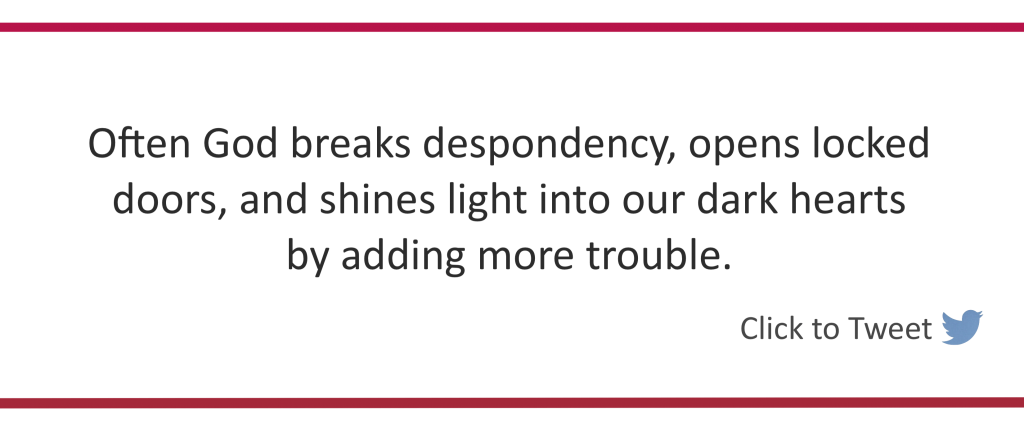Lilies, Bonus Lesson: Tell God How You Feel (Part 2)

Are you angry in the midst of your disappointment and pain? Are you telling God how you feel? Or are you sweeping your true feelings under a rug, painting on a big smile—superficially declaring everything is all right because God is in control?
As the previous post stated, there are psalms of darkness (almost as many as there are psalms of praise and thanks) in which the psalmists express their complaint, protest, and lament to God. This shows us that our seasons of darkness and the way they make us feel are proper subjects for discourse with God. Such expressions are acts of bold faith, not of unfaith or failure.
Anger Turned Godward: Moving in the Right Direction
Psalm 88 is one such Psalm of darkness:
From my youth,
I have been afflicted and near death.
I suffer Your horrors; I am desperate.
Your wrath sweeps over me;
Your terrors destroy me.
They surround me like water all day long;
they close in on me from every side.
You have distanced loved one and neighbor from me;
darkness is my only friend. (Psalm 88:15-18)
In When God Weeps, Joni E. Tada writes:
The author of Psalm 88 abruptly stops on a note of resentment. No set-up for a hopeful ending. No hand-is-quicker-than-the-eye move form moaning to happy-hearted praise Not even a sniff of joy in the entire eighteen verses. God seems snide and cruel, smashing underfoot helpless humans as thought they were cigarette butts. The words are ugly. Then again, so is life.
God is big enough to take on anger like this. It doesn’t fluster him.
First, he knows stuff happens. He himself said, “In this world you will have trouble.” Secondly, he doesn’t tiptoe around it, embarrassed and at wit’s end to explain our woes. He doesn’t cover up the gore and guts of a person’s rage like a Mafia hit man who trashes his blood-stained gloves so he doesn’t get nailed. Remember God’s rage nailed God to a cross. He wrote the book on suffering. And he invited people like the one who wrote Psalm 88 to be his co-authors. In so doing, he invited angry people to air their complaints. [i]
. . . .
Too often we repress our deep emotions about suffering. We choose the polite route, bottling up our unspeakable feelings toward God and hiding behind a religious pretense as we “give it all over to the Lord” too quickly. All we’ve done is shove the problem to the back burner. There it simmers. This is real trouble. We can’t smell problems burning when they’re repressed. And so, we naively think things will work out. But they don’t. [ii]
. . . .
Our deep emotions reveal the spiritual direction in which we are moving. Are we moving toward the Almighty or are we moving away from him? Anger properly makes Someone the issue of our suffering rather than some thing. And that’s moving in the right direction. … After all, the people you really get angry with are the ones you trust the most deeply. “I am mad as a hornet, God, and I don’t understand what you are doing one bit!” sounds like the dark side of trust, but it’s trust, nonetheless. [iii]

The Dark Side of Anger
Anger that propels us toward God is a good thing. But anger can be detrimental if it stems from (and feeds) pride and self-exaltation. Joni continues:
Anger has a dark side too. It has incredible potential to destroy.
It digresses into a black energy that demands immediate release and relief. It despises being vulnerable and helpless. It relishes staying in control. It loathes dependance on God and so gains macabre pleasure in spreading the poison of mistrust. Ironically, this sort of anger—unrighteous anger—turns on us. It is a liar, offering us satisfaction, when in truth it guts us and leaves us empty. …
Unrighteous anger—anger that leads us away from God—sucks the last vestige of hope from our hearts. We stop caring, stop feeling. We commit a silent suicide of the soul, and sullen despair moves in like a terrible damp fog, deadening our heart to the hope that we will ever be rescued, redeemed, and happy again.
God will not stand for this. He is intolerant of despair. … He will not permit our puny shields of unrighteous anger to stall him. And so he encroaches, presumes, invades, and infringes. He tears aside the curtains of despondency and throws open locked doors. He hits the light switch in our dark hearts. He pierces our complacency and boldly intrudes into our self-pity, brashly calling it what it is and challenging us to leave it behind.
He does it, occasionally, by heaping on trouble. [iv]
Is your anger righteous or unrighteous? Is it pushing you toward God or away from Him?
I can’t count how many times (especially in the first years of my illness) my anger turned into total despair and despondence. I was full of self-pity. My heart was absent any shred of hope.
What did God do in response? Thankfully, in His mercy and goodness, He heaped on more trouble.
Additional suffering didn’t push me further from God—it ultimately pushed me closer to Him. My suffering increased so far beyond my ability to endure, even for a few moments, that I had to run to Him. I had to turn to Him. And that meant turning my feelings toward Him and expressing my heart to Him.
My frustration at God didn’t immediately dissipate. However, I was no longer like a child on the floor throwing a temper tantrum, pounding the ground in anger, rising only to turn my back to Him, stick my bottom lip out, fold my arms in contempt … and pout.
No, with more trouble I was forced to be like the child who runs to her Daddy and pounds her fists on his chest. More trouble actually drew me closer to God. And as I conversed with Him, even in my anger, I couldn’t help but be filled with hope.
Questioning that Honors God
Will the Lord reject forever
and never again show favor?
Has His faithful love ceased forever?
Is His promise at an end for all generations?
Has God forgotten to be gracious?
Has He in anger withheld His compassion?(Psalm 77:7-9, HCSB)
Maybe these questions echo your own lately.
Be encouraged. The psalmist’s despair became godly when it turned toward God.
In Cry of the Soul, Dr. Dan Allender and Dr. Tremper Longman write:
We are too quick to explain away this kind of language. Most of us would be scared to death to talk to God this way. But what do we do instead? We repress our strong emotions, and too quickly and unreflectively “turn it over to God.” If we are honest with ourselves, however, we don’t really put it in God’s hands—we bottle it up within ourselves. The problem continues to exist, and our fear festers and grows inside of us, alienating us not only from our true emotions but also from God.
The irony of faith is that it is not a quiet submission to the fates. It asks, and it shouts; it is a cry that is heard in heaven. Faith does not affect pious language nor does it presume that honest struggle will be smashed in a fit of divine pique. The irony of questioning God is that it honors him: it turns our hearts away from ungodly despair toward a passionate desire to comprehend him. [v]
Gut-wrenching questions actually honor God. When we direct our anger and frustration toward God, it becomes a way of encountering Him. Especially when we use a Psalm like Psalm 77 to voice our questions. It’s a way of pursuing God. And when we seek Him, we will find Him.
–
More Tweetables
- Are you angry in the midst of your pain? Telling God how you feel expresses trust and helps you encounter Him.
Tweet
- God is big enough to take your anger. It’s clear from the psalms He invites angry people to air their complaints.
Tweet
- “Anger properly makes Someone the issue of our suffering rather than some thing. And that’s moving in the right direction. … After all, the people you really get angry with are the ones you trust the most deeply.” — Joni E. Tada,
Tweet
- Too often we unwisely repress our deep emotions about suffering and try to keep them from God.
Tweet
- God is intolerant of unrighteous anger—anger that leads us away from Him and sucks the last vestige of hope from our hearts. God will not stand for this. He is intolerant of despair.
Tweet
- Often God breaks despondency, opens locked doors, and shines light into our dark hearts by adding more trouble.
Tweet
- “Additional suffering didn’t push me further from God—it ultimately pushed me closer to Him. My suffering increased so far beyond my ability to endure that I had to run to Him, turn my feelings toward Him and express my heart to Him.” — Natalie Nichols
Tweet
- Questioning God in your pain turns your heart away from ungodly despair to a passionate desire to comprehend him.
Tweet
–
Questions:
- Are you angry in the midst of your disappointment and pain?
- What are you telling God? Are you telling Him how you feel — or sweeping your true feelings under a rug?
- Is your anger righteous or unrighteous? Is it pushing you toward God or away from Him?
OTHER POSTS IN THIS SERIES
- God Still Clothes the Lilies: 10 Lessons for Seasons of Uncertainty (Part 1)
- God Still Clothes the Lilies, Lesson 1: Rest in God’s Sovereign Rule
- God Still Clothes the Lilies, Lesson 2: View Your Needs from Heaven’s Higher Perspective
- God Still Clothes the Lilies, Lesson 3: Hope in God Alone
- God Still Clothes the Lilies, Lesson 4: Trust in God and His Deliverance
- God Still Clothes the Lilies, Lesson 5: Be Confident in God (Part 1)
- God Still Clothes the Lilies, Lesson 5: Be Confident in God (Part 2)
- God Still Clothes the Lilies, Lesson 6: Wait Expectantly for God
- God Still Clothes the Lilies, Lesson 7: Receive God’s Enabling
- God Still Clothes the Lilies, Lesson 8: Focus on God, Not Your Problems
- God Still Clothes the Lilies, Lesson 9 (Part 1): Give Thanks & Praise, Even in This
- God Still Clothes the Lilies, Lesson 9 (Part 2): 3 Results of Your Worship
- God Still Clothes the Lilies, Lesson 10: Reflect on God’s Past Goodness
- God Still Clothes the Lilies, Bonus Lesson: Tell God How You Feel (Part 1)
___________
[i] Joni E. Tada and Steve Estes, When God Weeps (Grand Rapids, MI: Zondervan, 1997), 150
[ii] Ibid., 150-151
[iii] Ibid., 151
[iv] Ibid., 152
[v] Dr. Dan Allender and Dr. Tremper Longman, Cry of the Soul (Colorado Springs, CO: Navpress, 1994), 149-150

Disclosure of Material Connection: Some of the links in the post above are “affiliate links.” This means if you click on the link and purchase the item, Shades of Grace will receive an affiliate commission. Regardless, I only recommend products or services I use personally and believe will add value to my readers. I am disclosing this in accordance with the Federal Trade Commission’s 16 CFR, Part 255 “Guides Concerning the Use of Endorsements and Testimonials in Advertising.”








 “Natalie Grace Nichols is experiencing God’s grace and freely expressing it. My wife, Betty, and I thank God for the ministry of Jesus through Natalie.”
“Natalie Grace Nichols is experiencing God’s grace and freely expressing it. My wife, Betty, and I thank God for the ministry of Jesus through Natalie.” “I’m so thankful that God is raising up women like Natalie for a new generation, providing biblically balanced teaching, encouragement, and comfort for people who are enduring life’s trials.”
“I’m so thankful that God is raising up women like Natalie for a new generation, providing biblically balanced teaching, encouragement, and comfort for people who are enduring life’s trials.”